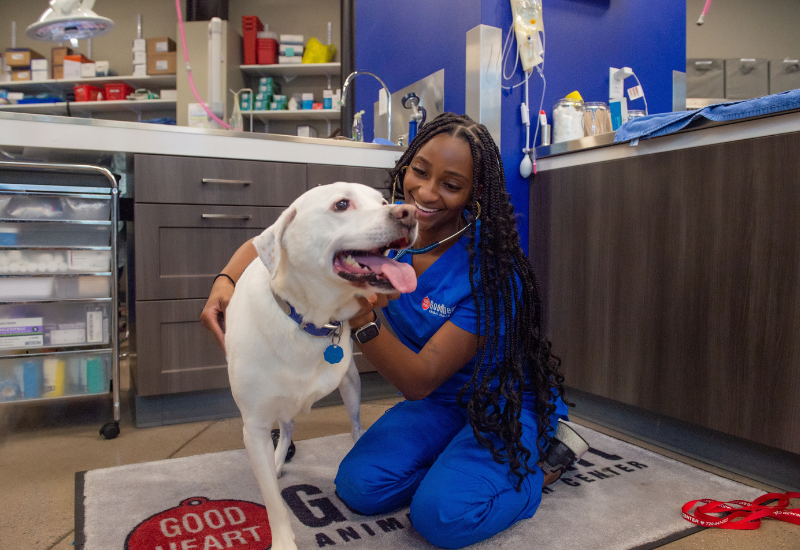Understanding Your Animals' Nutritional Requirements for Ideal Health And Wellbeing

Importance of Well Balanced Diets
Guaranteeing a well balanced diet for family pets is essential for their general wellness and well-being. Family pets, like humans, call for a mix of proteins, carbs, vitamins, fats, and minerals to preserve optimal health and wellness.
Integrating a selection of nutrients makes certain that animals preserve a robust immune system, healthy skin, and a shiny coat. Additionally, a balanced diet plan can stop a host of health and wellness problems such as weight problems, which is connected to diabetes and joint troubles, or lack of nutrition, which can bring about developing delays and body organ disorder.
Family pet owners need to be conscious of part dimensions and calorie intake, as overfeeding or underfeeding can have major repercussions. Consulting with vets or pet dog nutritional experts can assist tailor diet regimens to fulfill certain needs, ensuring that pet dogs obtain the proper balance of nutrients essential for their dimension, age, and task degree. A balanced and regular diet plan is essential for an animal's long life and happiness.
Species-Specific Nutritional Needs
Just how do various species of family pets have differing nutritional requirements? Each varieties has distinct metabolic paths, digestion systems, and dietary requirements that have to be satisfied for optimal health and wellness.
Birds, depending on their species, may call for a diet abundant in insects, seeds, or fruits, stressing the variety within the avian world. Pets. Reptiles, such as turtles and serpents, in a similar way demand species-specific diets, with some requiring high degrees of calcium and others, a well-calibrated equilibrium of bugs and plant issue
Failure to offer species-appropriate nutrition can bring about extras or shortages, hindering health and wellness and durability. Feeding a feline canine food could result in taurine shortage, leading to extreme health and wellness problems such as heart illness. Consequently, recognizing the dietary distinctions amongst different types is critical for pet dog owners. By catering and acknowledging to these differences, we ensure the arrangement of appropriate nutrition, supporting the overall well-being and vigor of our pet dogs.
Age and Dimension Factors To Consider
While species-specific nutritional requirements lay the structure for an animal's diet, age and size more fine-tune these demands. Young animals, such as kittens and young puppies, call for diet plans abundant in calories, healthy proteins, and vital nutrients to sustain rapid development and development. These young creatures have higher metabolic rates and call for more regular feedings to sustain their power levels and make sure correct development of muscular tissues, bones, and organs.
As pets age, their nutritional needs alter dramatically. Grown-up pets typically need less calories than their more youthful equivalents however still need a well balanced diet regimen to keep general health and wellness and vitality. Formulas designed for adult animals commonly concentrate on keeping weight, advertising digestive health, and supporting an energetic way of life. Conversely, elderly family pets might take advantage of specialized diet plans that deal with age-related difficulties, such as joint health, cognitive function, and organ support.

Health And Wellness Conditions and Dietary Adjustments
Certain wellness conditions can significantly affect the nutritional demands of pet dogs, necessitating tailored dietary adjustments to sustain their wellness. Animals with diabetes mellitus may benefit from diets that are high in fiber and reduced in simple carbohydrates to aid control blood sugar degrees. Similarly, obese animals frequently call for reduced-calorie diets to promote fat burning and stop associated health and wellness difficulties.
Pets with renal condition may need diet regimens reduced in phosphorus and protein to relieve kidney work. Omega-3 fats, known for their anti-inflammatory residential properties, can be helpful for family pets struggling with conditions like joint inflammation or inflammatory digestive tract condition. In addition, animals with food allergic reactions or intolerances might need hypoallergenic see here now diets, frequently needing a process of removal to recognize and exclude upseting components.
Veterinary assistance is crucial when making dietary modifications, as inaccurate nutrition can intensify existing health issue or cause brand-new ones. Routine monitoring and changes based on the pet's response to dietary modifications are crucial. A well balanced approach, taking into consideration both clinical and dietary requirements, makes certain that nutritional interventions contribute positively to managing health problems, enhancing not only the family pet's health however likewise their lifestyle.
Tips for Deciding On Quality Pet Food
Picking the best animal his comment is here food is important for ensuring your pet dog's wellness and durability. A balanced diet regimen supports their immune system, maintains healthy weight and advertises overall vigor. Begin by consulting your vet to understand your pet's certain nutritional requirements based upon breed, health, and age status.
When reviewing family pet food, look at the active ingredient list. High-grade pet foods typically provide actual meat, chicken, or fish as the key ingredient.
This shows the food fulfills well-known dietary standards. Brands with a background of recalls or inadequate quality control ought to be approached with caution.
Consider whether your pet would take advantage of special formulations such as grain-free, high-protein, or limited-ingredient diets. These can be valuable for pet dogs with allergic reactions or certain health problems. Last but not least, observe your family pet's action to the food. Screen their coat problem, power degrees, and digestion to ensure the diet regimen works.
Verdict
A detailed understanding of pet dogs' nutritional requirements is vital for advertising their optimum health and wellbeing. By adhering to these principles, animal owners can considerably add to their pet dogs' development, power degrees, and overall health, fostering a happier and healthier life.

Picking the appropriate pet food is critical for guaranteeing your pet's health and longevity. By sticking to these principles, animal owners can considerably contribute to their pet dogs' growth, energy levels, and overall health, cultivating a better and much healthier life.
Comments on “Common Health Issues in Pets and How to stop Them Properly”